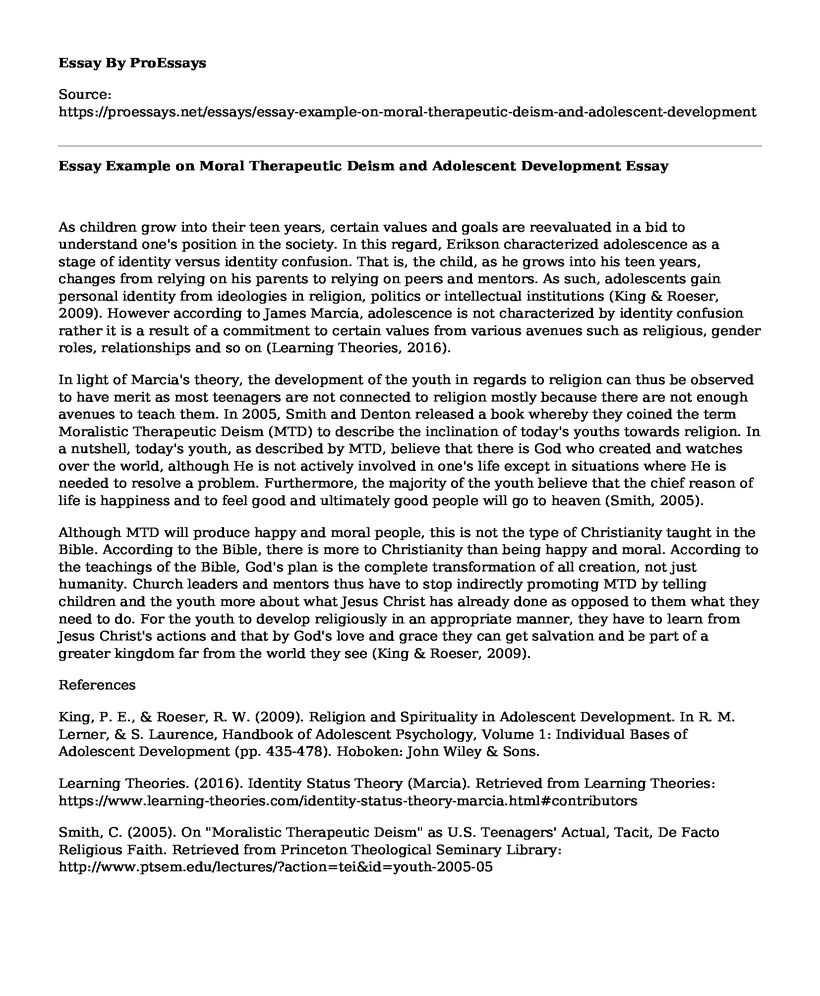As children grow into their teen years, certain values and goals are reevaluated in a bid to understand one's position in the society. In this regard, Erikson characterized adolescence as a stage of identity versus identity confusion. That is, the child, as he grows into his teen years, changes from relying on his parents to relying on peers and mentors. As such, adolescents gain personal identity from ideologies in religion, politics or intellectual institutions (King & Roeser, 2009). However according to James Marcia, adolescence is not characterized by identity confusion rather it is a result of a commitment to certain values from various avenues such as religious, gender roles, relationships and so on (Learning Theories, 2016).
In light of Marcia's theory, the development of the youth in regards to religion can thus be observed to have merit as most teenagers are not connected to religion mostly because there are not enough avenues to teach them. In 2005, Smith and Denton released a book whereby they coined the term Moralistic Therapeutic Deism (MTD) to describe the inclination of today's youths towards religion. In a nutshell, today's youth, as described by MTD, believe that there is God who created and watches over the world, although He is not actively involved in one's life except in situations where He is needed to resolve a problem. Furthermore, the majority of the youth believe that the chief reason of life is happiness and to feel good and ultimately good people will go to heaven (Smith, 2005).
Although MTD will produce happy and moral people, this is not the type of Christianity taught in the Bible. According to the Bible, there is more to Christianity than being happy and moral. According to the teachings of the Bible, God's plan is the complete transformation of all creation, not just humanity. Church leaders and mentors thus have to stop indirectly promoting MTD by telling children and the youth more about what Jesus Christ has already done as opposed to them what they need to do. For the youth to develop religiously in an appropriate manner, they have to learn from Jesus Christ's actions and that by God's love and grace they can get salvation and be part of a greater kingdom far from the world they see (King & Roeser, 2009).
References
King, P. E., & Roeser, R. W. (2009). Religion and Spirituality in Adolescent Development. In R. M. Lerner, & S. Laurence, Handbook of Adolescent Psychology, Volume 1: Individual Bases of Adolescent Development (pp. 435-478). Hoboken: John Wiley & Sons.
Learning Theories. (2016). Identity Status Theory (Marcia). Retrieved from Learning Theories: https://www.learning-theories.com/identity-status-theory-marcia.html#contributors
Smith, C. (2005). On "Moralistic Therapeutic Deism" as U.S. Teenagers' Actual, Tacit, De Facto Religious Faith. Retrieved from Princeton Theological Seminary Library: http://www.ptsem.edu/lectures/?action=tei&id=youth-2005-05
Cite this page
Essay Example on Moral Therapeutic Deism and Adolescent Development. (2021, Mar 31). Retrieved from https://proessays.net/essays/essay-example-on-moral-therapeutic-deism-and-adolescent-development
If you are the original author of this essay and no longer wish to have it published on the ProEssays website, please click below to request its removal:
- The Legend of the Black Mecca Critical Analysis Paper Example
- Millennial Ignorance of Holocaust
- Research Paper on The Effects of Conformity
- Essay Example on Buddhism: A Religion of Unity, Not Difference
- Paper Example on Understanding Worldviews: A Historical Perspective
- Essay Example on Tech Industry Diversity: Employer Perceptions, Stereotypes & Unfavourable Climate
- Essay Sample on Child Abuse & Substance Abuse: 25% of Children at Risk







